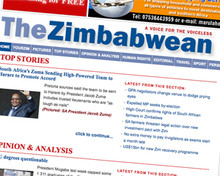
"It's safe here for me. I don't have to worry about a knock on the door at 4am in the morning," he says.
A critic of President Robert Mugabe's regime, Mbanga was arrested in 2001. In 2003 the government shut down Zimbabwe's only independent national newspaper, The Daily News, where he was the publisher's managing director.
"[The state-controlled media] declared me an enemy of the people," he says. The same year he fled to the Netherlands before settling in the UK.
After working as a journalist for 40 years, Mbanga launched The Zimbabwean, a weekly newspaper, starting off with a modest circulation of 5,000 copies in the UK and South Africa.
"Zimbabweans in the diaspora are desperate for information from back home," he explains.
Realising the popularity of The Zimbabwean, the print run increased to 200,000 and began to send truckloads into Zimbabwe itself. It soon became the country's best selling newspaper.
The Zimbabwean is now at the heart of the struggle to dislodge Mugabe's iron grip on the country.
With the opposition party, the Movement for Democratic Change (MDC), led by Morgan Tsvangarai, finally gaining a foothold in government last year, there is now hope that the state could allow private media back into Zimbabwe.
However, Mbanga refused to return to Zimbabwe for a UNESCO-organised meeting of private and public editors in the capital, Harare, this month, when the organisation failed to get concrete assurance from the government that he would not be harmed.
While sympathetic to Tsvangirai's struggle to reform the country, Mbanga is critical of the zero progress made to redraft Zimbabwe's oppressive media laws.
"We are hopeful, but disappointed since the new government came to power. It has been a year since that agreement," he says.
For now The Zimbabwean will remain a registered company in South Africa so that Mugabe's ruling Zimbabwe African National Union-Patriotic Front (Zanu-PF) party cannot shut it down, as it did The Daily News.
This is a far from perfect solution. Edited in the UK and printed in South Africa, it usually takes a whole day after press for a truck to take copies into Zimbabwe.
"It does present a problem in breaking stories," admits Mbanga. "Obviously I'm far away from the action. I would rather be there."
This has not stopped attempts to suppress the paper: in May last year a truck with around 60,000 copies was hijacked, burned and the driver beaten up by assailants.
Luckily, this was a one-off: "[The government] realised that burning the news will attract world headlines."
On the ground all of Mbanga's reporters live in fear. In early 2008 one was arrested and badly tortured. When Zanu-PF enforcers visited another journalist they quickly fled into exile. Around 18 now work in Zimbabwe, mostly reporting in clandestine conditions.
"It's a tricky one. They do attend press conferences from time to time, but they can't go to government press conferences, but the Movement for Democratic Change [the opposition party] will invite them. Sports journalists are able to go to press conferences," he says.
"We do publish bylines of the two reporters who are known. The others are pseudonyms."
Unable to shut the newspaper down, the government attempted to bleed The Zimbabwean dry financially. In June last year it imposed a massive increase on import duty on foreign press, from 15 to 75 per cent, claiming that ‘hostile foreign newspapers' were coming into the country.
"We have got a number of donor agencies funding us, because [the newspaper] does not make economic sense. We reduced the number of copies from 200,000 to 60,000," says Mbanga.
Under pressure from opposition parties and donors the exorbitant tariff was lifted in August this year.
Since then The Zimbabwean has increased its the publication dates to Sunday, Tuesday and Thursday, with a circulation of 20,000 to 30,000 thousand copies in Zimbabwe, and another 23,000 in the UK and other southern African countries.
It has also gained international attention after the huge success of its South African advertisement campaign, winning 18 advertising awards, including six at Cannes in June.
Billboards, posters and walls were plastered with now worthless Zimbabwean dollars made unusable by hyper-inflation. Printed on the dollars striking taglines included: 'It's cheaper to print this on money than on paper' and 'Thanks to Mugabe this money is wallpaper'.
Mbanga now hopes to bring the same campaign to the UK early next year to raise the profile of The Zimbabwean and awareness of Zimbabwe's continued plight.
He is also keen to find new ways to make use of the internet and social media. Though the paper has not yet got a Twitter profile, the network messaging tool is something he is keen to look into.
"One of the successful things in Zimbabwe has been the cellphone. There are now more than two million Zimbabweans with cellphones," he says.
"I can see us benefiting from Twitter. I like to consider it as just another platform to spread awareness."
Chris Kay (@christopherkay) is a postgraduate newspaper journalism student at City University.
Free daily newsletter
If you like our news and feature articles, you can sign up to receive our free daily (Mon-Fri) email newsletter (mobile friendly).
Related articles
- #JournalismMatters: The challenges of journalism in exile
- What to do if you are threatened with a SLAPP lawsuit
- WAN-IFRA: Five challenges to press freedom
- Economics woes affecting UK press freedom, RSF World Press Freedom Index finds
- Predictions for journalism 2024: misinformation, online safety and press freedom









